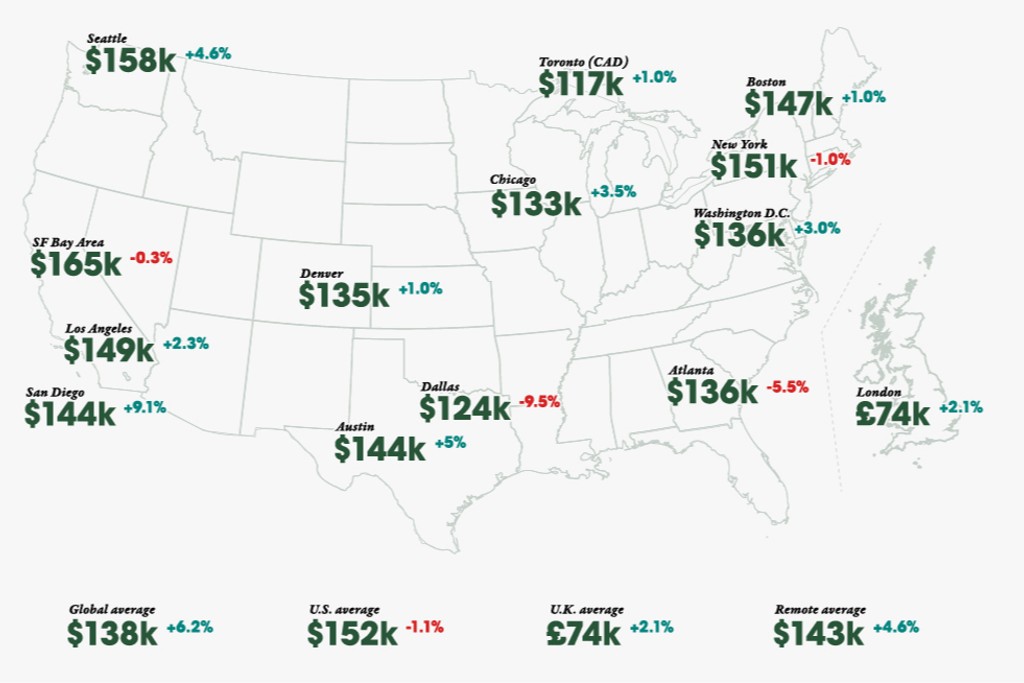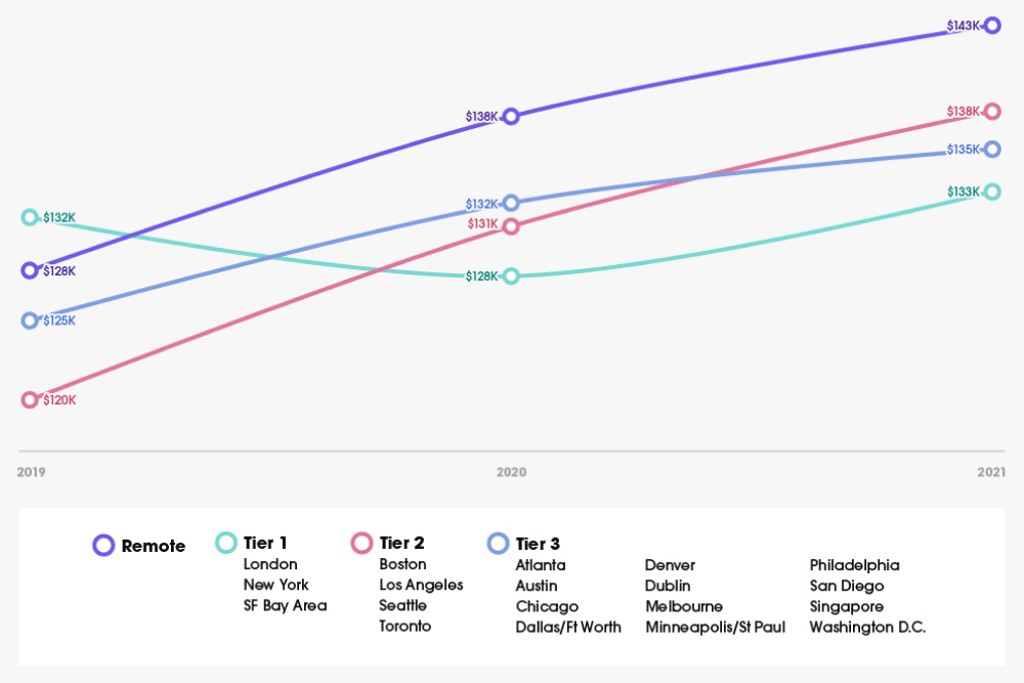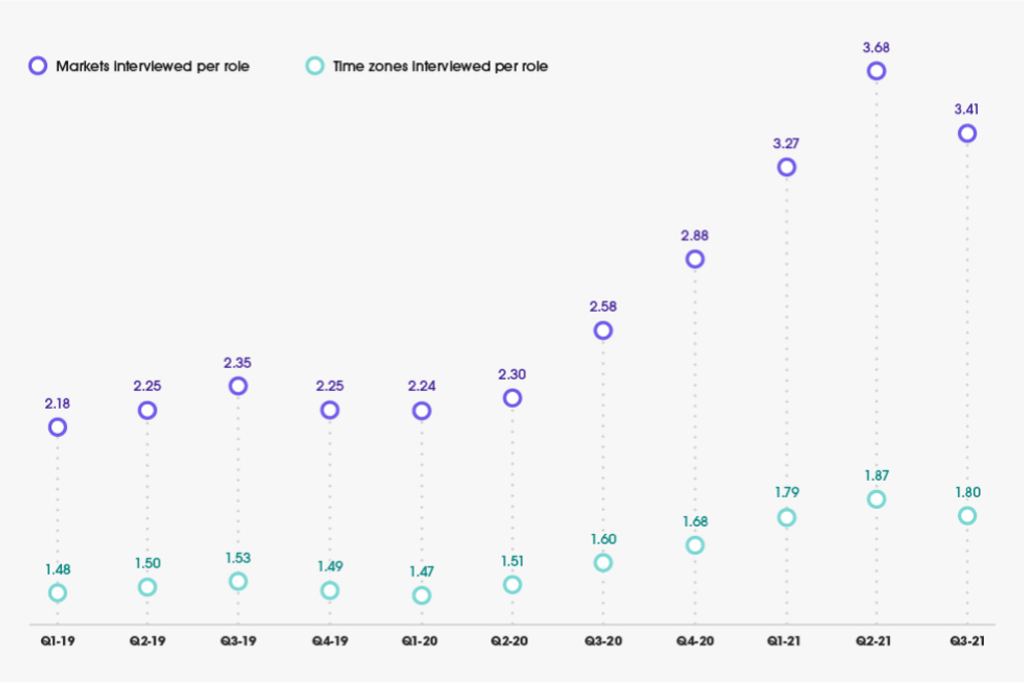At the same time, the hunger for top talent is increasing. Companies are struggling to attract the best fit candidates for open positions. The Great Resignation, a trend where large numbers of employees are quitting their jobs in response to the pandemic, has created an unprecedented challenge for companies who are striving to attract and maintain highly skilled employees.
In this competitive environment, how can companies attract and keep talent?
In Hired’s 2021 State of Tech Salaries report, the company examines the U.S., U.K. and remote job markets and offers advice for companies to redesign their hiring strategy to attract the right talent. Hired is one of the Adecco Groups business units.
“While the Great Resignation causes many challenges, employees leaving their jobs in droves also means that companies have an incredible opportunity to hire some of the best, diverse talent that's on the market right now. Increasing hiring efficiency and offering the right benefits will be absolutely critical to compete for top tech talent,” Josh Brenner, Hired CEO, told Forbes.
Here are the key takeaways from the report.
Contributing factors to salary trends
Competitive job market. The need for top talent is high, but the number of employees is not enough to fill the total demand, making this a tight job market. To speed up recruitment and stay on top of their hiring needs, companies are hiring junior candidates with less experience and investing in their development instead. This practice is exerting a downward pressure on salaries for junior employees, though top tech talent salaries continue to rise (Hired: US, UK, and remote).
Remote work. Tech salaries for remote jobs and candidates from smaller markets have seen the most growth. By offering flexible work arrangements, companies can diversify their candidate pools, increasing their chances of finding employees and filling lower-paying jobs.
Despite the ability to relocate and work from places with lower living costs, the majority of employees (57%) wants to be fairly compensated. Furthermore, pay varies by industry, market, and role demands but in general, all markets saw salaries increase for experienced candidates.

Hiring during the Great Resignation: here’s what employees want
Salary expectations. Only 3% of the employees in Hired’s report expect their salaries to decrease in the coming months. Over 90% expect their salaries to stay the same (40%) or increase (57%). An incredibly high 74% indicates that not getting a pay rise is reason enough to look for a new job.
Salary trade-offs. Despite compensation being the most important factor in the decision to accept a new job, 27% of tech professionals will accept a lower salary in exchange for company stock.
Career plans. More than half of all employees, from junior professionals to employees with years of experience, are considering a career move in the next six months.
Benefit preferences. Paid time off, flexible working schedules, and health insurance are among the most important benefits for employees. Age and experience do play a role though. Junior employees value benefits such as tuition reimbursement more than experienced employees who value childcare and parental leave.

Hired’s advice for employers
Salary transparency. It’s a candidate-driven market and salary transparency is important for people looking for new opportunities. Also, employers should be transparent about their compensation models if they wish to keep their employees. Companies failing to manage compensation expectations will lead to high employee turnover.
Employee benefits. If you are looking to hire and keep talent, make sure your company provides a good mix of compensation and additional benefits tailored to your employees’ needs. “Increasing hiring efficiency and offering the right benefits will be absolutely critical to compete for top tech talent,” said Hired’s CEO Josh Brenner. Flexible working hours, paid time off and health insurance are attractive benefits for employees, while candidates looking to accept a new job highly value decent compensation, a good work-life balance and a supportive company culture.
Remote work options. Redesign your hiring strategy to look for talent across geographies. An overwhelming majority of candidates (93%) on Hired’s platform had a preference for remote, so if you are not offering remote work possibilities you are missing out on top talent. According to the Microsoft Work Trend Index, remote job postings on LinkedIn have increased by over 5 times since the start of the pandemic. Meanwhile, in Europe, the number of job ads that mention remote work opportunities have increased by 126% in over the period between May 2020 through April 2021, compared to the prior year, according to our data. “As companies look to maximize their talent pipelines and meet high demands, we see that the majority of open job positions on Hired’s marketplace are now open to remote—a 5x increase since January 2020. Remote work preferences from Hired candidates are also at a record high, with over 90% indicating a preference for remote roles,” Brenner told Forbes.Digital data tools. Employers should leverage digital data to improve speed and attract skilled talent. Using AI-driven hiring solutions employers can target and hire the right talent faster. Digital data tools also help employees to find the right job and avoid disappointment.

The Learning Lesson
Companies need to redesign their hiring strategies to fit the post-pandemic future of work. New realities, which might have been unthinkable before, are influencing the way people perceive their jobs and career identities.
This is an opportunity for employers to plan for the long term; if your company needs insights and recommendations, download our Resetting Normal for an essential read for leaders and companies as they continue to evolve and adapt for the next normal. There is a great pool of talent looking for their future job, either working remotely or on location.



